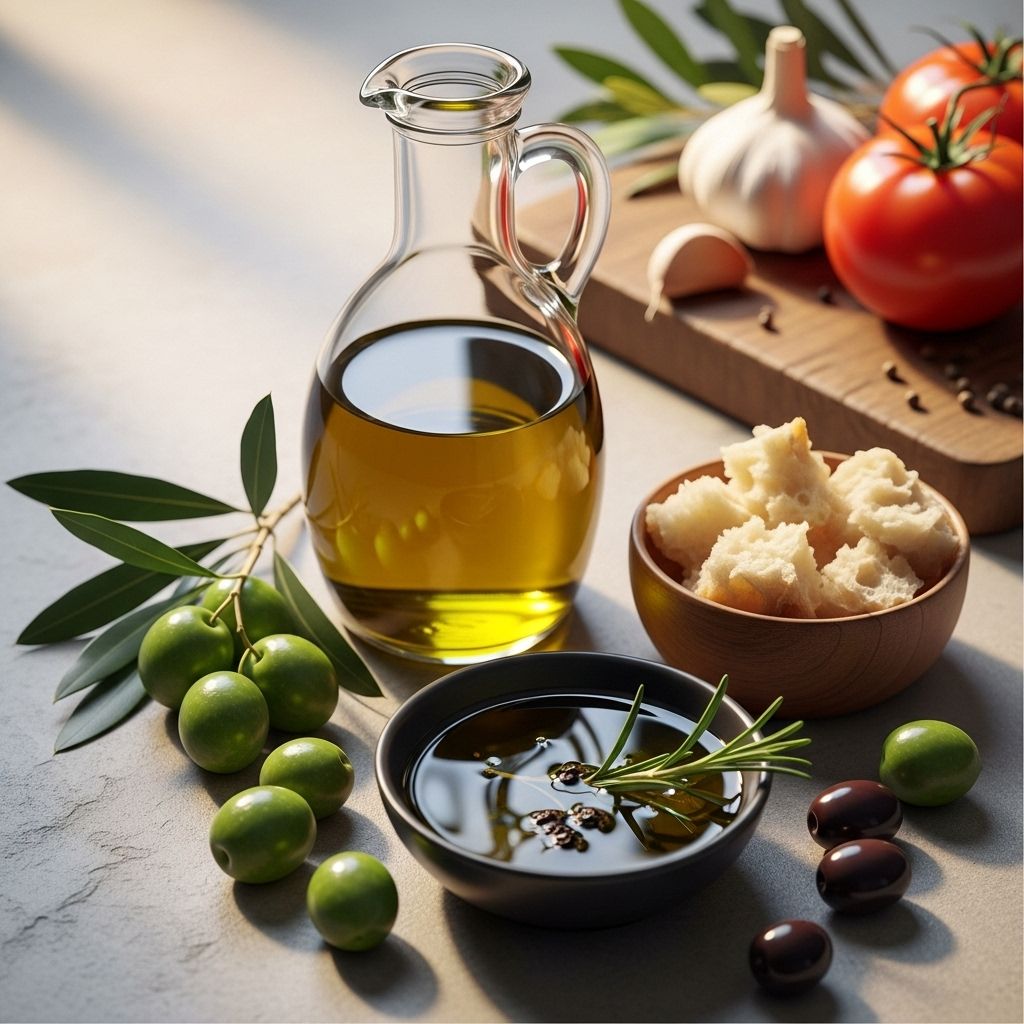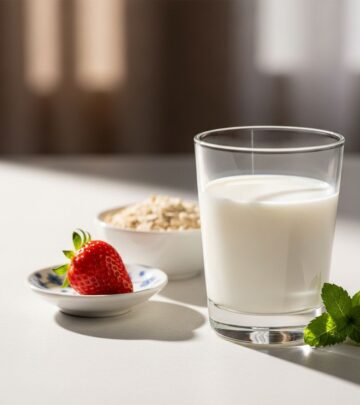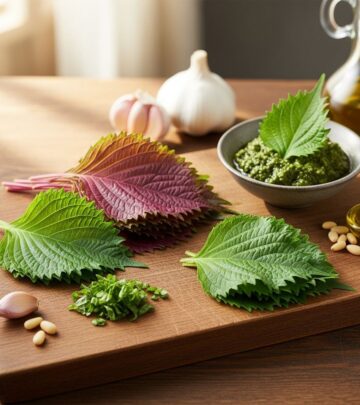Extra Virgin Olive Oil: Proven Health Benefits, Nutritional Facts, and Usage Guide
Discover the science-backed health benefits, nutrition facts, and best uses of extra virgin olive oil.

Table of Contents
- Introduction
- Nutritional Profile
- Major Health Benefits
- Heart Health
- Weight Management
- Blood Sugar Control
- Brain Health
- Anti-Inflammatory Effects
- Potential Anti-Cancer Properties
- Other Health Benefits
- Types of Olive Oil
- How to Choose Extra Virgin Olive Oil
- Usage Tips in Cooking and Diet
- Extra Virgin Olive Oil in the Mediterranean Diet
- Recent Research and Findings
- Comparison with Other Fats
- Frequently Asked Questions
- Conclusion
- References
Introduction
Extra virgin olive oil (EVOO), often called the “liquid gold” of the Mediterranean, is widely recognized as one of the healthiest edible oils available today. Extracted from the first pressing of olives without the use of heat or chemicals, EVOO retains its natural flavor, aroma, and most importantly, its rich array of bioactive compounds. Numerous studies have associated the regular consumption of EVOO with a reduced risk of chronic diseases, improved longevity, and better overall health. This article comprehensively explores the science behind extra virgin olive oil, its nutritional makeup, and practical ways to incorporate it into a healthy lifestyle.
Nutritional Profile
Extra virgin olive oil is primarily composed of monounsaturated fats—about 71% of its content is oleic acid, a healthy fat that is resistant to high heat and has been linked to multiple health benefits. The oil also contains:
- Saturated fat: Approximately 13.8%
- Polyunsaturated fats (omega-6 and omega-3): About 10.5%
- Antioxidants: Including vitamin E, vitamin K, and potent polyphenols such as oleocanthal and oleuropein
- Other bioactive compounds: Phenolic acids, flavonoids, and squalene
These components work synergistically to promote health, with the polyphenols and antioxidants playing a particularly important role in the oil’s health-promoting effects.
Major Health Benefits
Research has consistently demonstrated that EVOO offers a wide spectrum of health benefits, making it a cornerstone of the Mediterranean diet and a top choice for health-conscious consumers worldwide.
Heart Health
EVOO is perhaps best known for its positive effects on cardiovascular health. Studies show that regular consumption can:
- Lower LDL (bad) cholesterol: The polyphenols in EVOO are especially effective at reducing LDL cholesterol, a major risk factor for heart disease.
- Raise HDL (good) cholesterol: HDL helps remove cholesterol from the arteries, further protecting heart health.
- Reduce blood pressure: The phenolic compounds in EVOO can improve endothelial function and lower both systolic and diastolic blood pressure.
- Improve blood vessel function: EVOO helps maintain healthy blood vessel linings, reducing the risk of atherosclerosis.
- Lower risk of stroke: Large observational studies have associated higher olive oil intake with a reduced risk of fatal cardiovascular events.
Replacing saturated fats (like butter) and refined oils with EVOO is linked to even greater cardiovascular benefits.
Weight Management
Contrary to the outdated notion that all fats contribute to obesity, the monounsaturated fats in EVOO can actually help with weight management. These fats are satisfying and can reduce appetite, potentially leading to lower calorie intake overall. Additionally, the polyphenols in EVOO may improve metabolic health and reduce the accumulation of abdominal fat, further supporting a healthy weight.
Blood Sugar Control
EVOO has demonstrated benefits for glycemic control, making it a good choice for people with type 2 diabetes or those at risk. It can help stabilize blood sugar levels after meals, reduce insulin resistance, and support overall metabolic health. These effects are attributed to both the healthy fats and the polyphenols in the oil.
Brain Health
Emerging research suggests that the antioxidants and anti-inflammatory compounds in EVOO may protect against neurodegenerative diseases such as Alzheimer’s and Parkinson’s disease. Oleocanthal, in particular, may help prevent the buildup of proteins associated with Alzheimer’s, while the oil’s overall ability to reduce inflammation and oxidative stress supports cognitive function as people age. Long-term, high consumption of EVOO has also been associated with a lower risk of death from neurodegenerative conditions.
Anti-Inflammatory Effects
Chronic inflammation is a root cause of many serious diseases, including heart disease, cancer, and arthritis. EVOO contains oleocanthal, a compound with anti-inflammatory properties comparable to ibuprofen. The oil’s antioxidants also reduce levels of inflammatory markers in the body, such as C-reactive protein (CRP), thus lowering the risk of inflammation-related diseases.
Potential Anti-Cancer Properties
While no single food can prevent cancer, population studies have linked regular EVOO consumption with a lower risk of certain cancers, particularly breast and digestive system cancers. This is thought to be due to the oil’s high antioxidant and anti-inflammatory content, which may help protect cells from damage that can lead to cancer development.
Other Health Benefits
Beyond the major benefits listed above, EVOO has been associated with:
- Reduced risk of rheumatoid arthritis: Its anti-inflammatory effects may help alleviate symptoms of rheumatoid arthritis.
- Antibacterial properties: Some compounds in EVOO can inhibit the growth of harmful bacteria, including Helicobacter pylori, which causes stomach ulcers.
- Gut health: Preliminary research suggests EVOO may positively influence gut microbiota, supporting digestive health.
Types of Olive Oil
Not all olive oils are created equal. The main types include:
- Extra virgin olive oil: The highest quality, made from the first pressing of olives, with no chemicals or excessive heat used. It has the most flavor, aroma, and health benefits.
- Virgin olive oil: Slightly lower quality than extra virgin, with higher acidity and fewer nutrients.
- Pure olive oil: A blend of refined and virgin oils. Lacks the flavor and nutritional properties of extra virgin.
- Light olive oil: Highly processed, with most of the flavor, color, and nutrients removed. Not recommended for health benefits.
For maximum health benefits, always choose extra virgin olive oil.
How to Choose Extra Virgin Olive Oil
To ensure you’re getting authentic, high-quality EVOO:
- Look for the harvest date on the label; fresher oil retains more nutrients.
- Check for certification seals (e.g., PDO, PGI, USDA Organic).
- Choose dark glass bottles to protect against light degradation.
- Avoid oils with a rancid or musty smell.
Usage Tips in Cooking and Diet
EVOO is versatile in the kitchen and can be used in many ways:
- Use as a finishing oil: Drizzle over salads, soups, or cooked vegetables to maximize flavor and nutrient retention.
- Cooking: Despite common myths, EVOO is stable at moderate cooking temperatures and can be used for sautéing, roasting, and baking.
- Replace unhealthy fats: Swap butter, margarine, or mayonnaise with EVOO in recipes for a healthier choice.
- Daily consumption: Aim for 1–2 tablespoons per day as part of a balanced diet.
Combining EVOO with other plant-based fats (such as nuts, seeds, and avocados) may provide even greater health benefits, according to recent research.
Extra Virgin Olive Oil in the Mediterranean Diet
EVOO is a key component of the Mediterranean diet, which is consistently ranked as one of the healthiest dietary patterns in the world. The diet emphasizes plenty of fruits, vegetables, whole grains, legumes, nuts, fish, and moderate wine consumption, with EVOO as the primary fat source. This combination has been linked to lower rates of chronic disease and increased longevity.
Recent Research and Findings
New studies continue to reinforce the benefits of EVOO. For example, research from the University of Florida found that while both high- and low-EVOO plant-based diets reduced LDL cholesterol, the diet with less EVOO resulted in greater LDL reductions when participants had previously consumed more EVOO. This suggests that a variety of plant-based fats may offer optimal benefits.
Another large Harvard study showed that replacing butter, margarine, or mayonnaise with olive oil was associated with a longer life expectancy and a lower risk of death from cardiovascular disease, cancer, and neurodegenerative diseases. These findings highlight the importance of overall dietary quality and the role of EVOO as part of a broader healthy eating pattern.
Comparison with Other Fats
| Fat Type | Main Fatty Acids | Antioxidant Content | Health Impact |
|---|---|---|---|
| Extra virgin olive oil | Mostly monounsaturated (oleic acid) | High (polyphenols, vitamin E) | Reduced heart disease, inflammation, and chronic disease risk |
| Butter | Mostly saturated | Low | Increases LDL cholesterol and heart disease risk |
| Margarine | Varies (often high in trans fats) | Low | Linked to inflammation and increased disease risk |
| Vegetable oils (refined) | Mostly polyunsaturated (omega-6) | Low (processed out) | May promote inflammation if consumed in excess |
Frequently Asked Questions
Is extra virgin olive oil good for cooking?
Yes, EVOO is suitable for cooking at moderate temperatures due to its high smoke point and monounsaturated fat content. However, for very high-heat cooking (e.g., deep frying), other oils may be more appropriate.
How much extra virgin olive oil should I consume daily?
Most health experts recommend 1–2 tablespoons per day as part of a balanced diet. Always consider your total calorie and fat intake.
Can extra virgin olive oil help with weight loss?
When used in moderation and as a replacement for less healthy fats, EVOO can support weight management by increasing satiety and improving metabolic health.
What is the difference between extra virgin olive oil and regular olive oil?
Extra virgin olive oil is made from the first pressing of olives with no chemicals or high heat, retaining the most nutrients and flavor. Regular olive oil is often refined and blended, with fewer health benefits.
Does extra virgin olive oil go bad?
Yes, EVOO can become rancid over time, especially when exposed to light, heat, or air. Store it in a cool, dark place and use within 6 months to a year after opening.
Is all extra virgin olive oil high in polyphenols?
No, polyphenol content varies depending on the olive variety, growing conditions, and processing methods. Look for oils labeled as “high phenolic” for maximum benefit.
Conclusion
Extra virgin olive oil is a nutritional powerhouse, offering a wide array of health benefits backed by decades of scientific research. Its rich content of monounsaturated fats, antioxidants, and anti-inflammatory compounds supports heart health, brain function, metabolic balance, and longevity. When incorporated into a Mediterranean-style, plant-based diet, EVOO can be a cornerstone of a healthy lifestyle. However, it’s important to remember that overall dietary quality—emphasizing whole, minimally processed foods—matters most for optimal health. By choosing high-quality EVOO and using it wisely in your kitchen, you can enjoy both its flavor and its profound health benefits for years to come.
References
- Healthline: 11 Proven Benefits of Olive Oil
- PMC: Virgin Olive Oil and Health: Summary of the III International Conference
- PMC: Is Extra Virgin Olive Oil the Critical Ingredient Driving the Health Benefits of the Mediterranean Diet?
- University of Florida: ‘Less-is-more’ approach to EVOO consumption
- Harvard Health: High olive oil consumption associated with longevity
References
- https://www.healthline.com/nutrition/11-proven-benefits-of-olive-oil
- https://pmc.ncbi.nlm.nih.gov/articles/PMC6770785/
- https://pmc.ncbi.nlm.nih.gov/articles/PMC10346407/
- https://blogs.ifas.ufl.edu/news/2024/08/21/uf-olive-oil-study-suggests-less-is-more-approach/
- https://www.health.harvard.edu/staying-healthy/harvard-study-high-olive-oil-consumption-associated-with-longevity
- https://health.clevelandclinic.org/benefits-of-olive-oil
- https://www.forksoverknives.com/wellness/first-of-its-kind-study-challenges-the-health-halo-of-olive-oil/
- https://www.health.harvard.edu/nutrition/is-extra-virgin-olive-oil-extra-healthy
- https://www.news-medical.net/news/20230829/An-update-on-the-health-benefits-of-olive-oil.aspx
Read full bio of Sneha Tete











